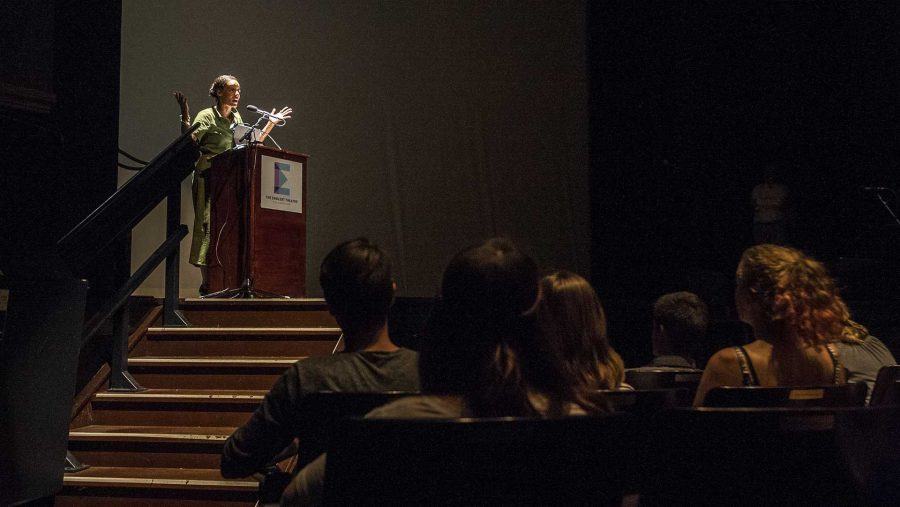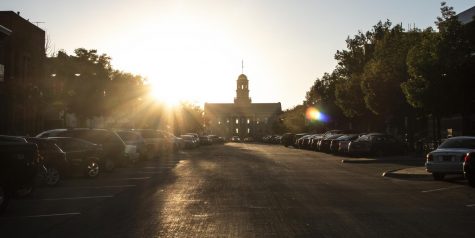Hegde: For the love of learning
The Senior College and The Green Room class at the UI have one thing in common: they both want their students to find passion in discovering new things.
Lisa Lucas, the first African American Executive Director of the National Book Foundation, speaks to an audience at The Englert theatre on Monday, Sept. 25, 2017. Lucas was hosted by the University Lecture Committee in collaboration The Green Room. She spoke on the importance of literature and its ability to bridge together communities from different backgrounds.
October 3, 2018
Overflowing with heavy class loads and major-related activities, I — among many other students — have pondered whether the required classes I take have any purpose at all. College can seem like a race to the finish line, and it can be easy — especially in the heat of midterms — to schedule classes with no intention other than to check courses off the degree audit.
While it can be difficult to look past outside motivations in a goal-oriented place such as college, learning for learning’s sake is a much-needed character trait that is not appreciated enough. That being said, programs at the University of Iowa display that the love for learning can still be present on a college campus, and there is hope to spread the message to the community.
With course names such as “Roll Over Beethoven” and “Autopsies, Forensics Pathology, and Medical Examiners: This is Not TV,” the Senior College quickly establishes a unique personality, displaying right in their titles that the classes are taught with no goal other than to learn. While retired professors are a large portion of the faculty for the Senior College, the program also brings in outside members with specific experience — for example, the conductor for the Iowa Orchestra taught a music course.
The program is a set of courses made to accommodate retired individuals, run by a 14-person committee made up of retired faculty and staff. The two-hour classes take place once on a weekly basis for four weeks and consist primarily of individuals over 50 years old.
H.D. Hoover, the committee chair of the Senior College and previously a UI statistics professor, said many of the Senior College students had little time to pursue the topics they were interested in when they were younger, having “something they always wanted to know about but didn’t get to learn.” He also noted that members of the Senior College are some of the most enthusiastic students he has ever worked with.
RELATED: Newby: Alternative schooling outgrows its stigma and reaps success
“Many of them make up for [struggling with coursework] in motivation,” he said.
As a current Green Room student, I have experienced firsthand that the class is a learning revolution. Run through the Honors Program, the class — only running until mid-October — is open to Honors students but more importantly, is also available to the Iowa City community. All are welcome to join the free weekly lectures, given by thought leaders — those who are passionate about their craft and aim to share their passion with the rest of the population.
The original goal when forming the blueprint for the class was to discover how to structure courses to be meaningful. Honors Program faculty member and instructor for the Green Room David Gould said the inquiry of how “a purpose serves your life” shaped the course, with the ultimate question of the class being how people can learn from each other. Gould said learning should be a joyful process and that the best part of discovering learning as a beautiful concept is “realizing you are only scratching the surface.”
All of the lecturers for the Green Room are similar in that they did not take up their passion for the sake of wealth or prosperity — it is clear that they became experts in their work simply because it is what gave their life meaning. Gould described the Green Room audience not as students but as active participants in the unique learning process, “not taking notes to be tested, [rather] writing things that resonate with them.”
College can be a long road, and constant pressure to meet deadlines can turn even your favorite subjects into a nightmare. However, college is also a time of great discovery, and it should be a place in which students are able to find a fervor in the process of finding their purpose in life. The Green Room and Senior College show that the best way to do this is to diversify your interests and to learn simply for the sake of considering the unknown.





















